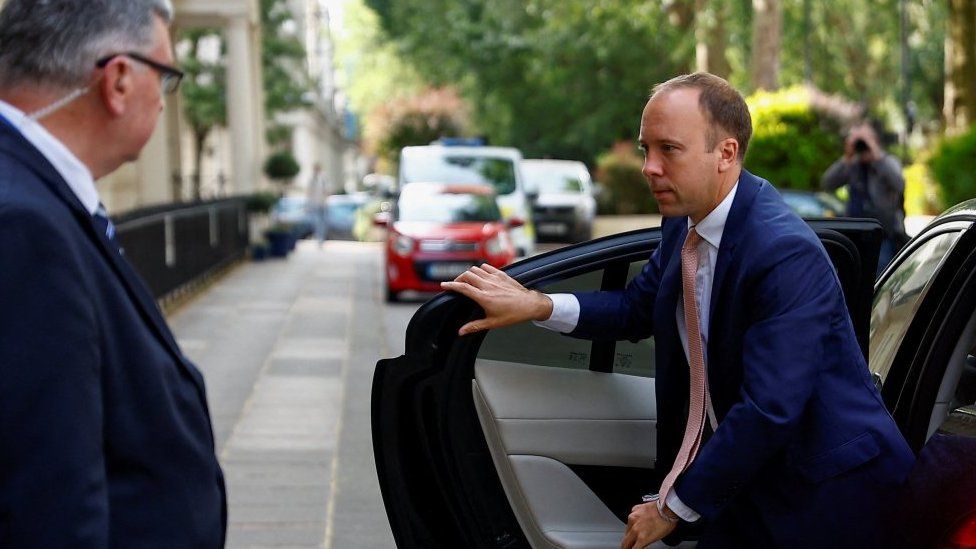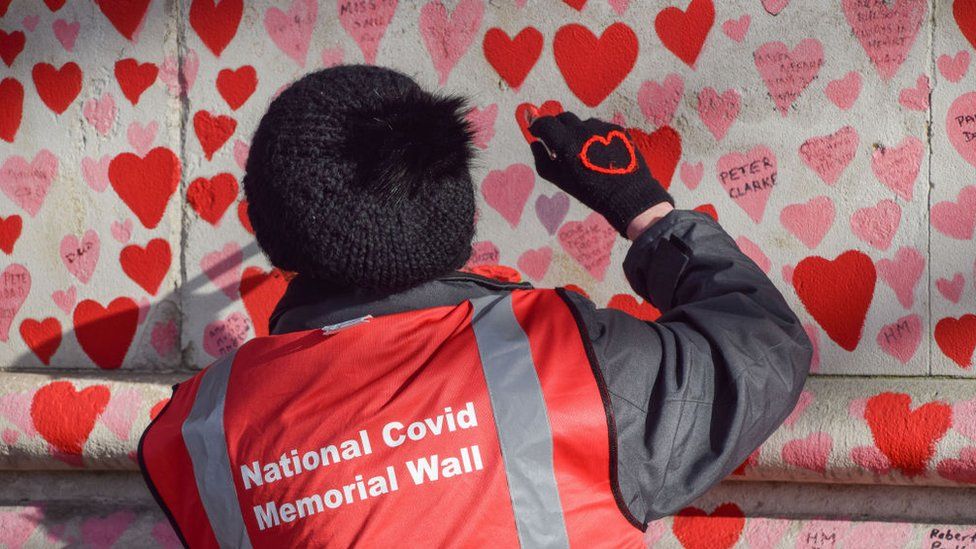Matt Hancock says UK's pandemic strategy was completely wrong
Published27 JuneShareclose panelShare pageCopy linkAbout sharingThis video can not be playedTo play this video you need to enable JavaScript in your browser.By Jim Reed and Michelle RobertsBBC NewsEx-health secretary Matt Hancock has criticised the UK’s pandemic planning before Covid hit, saying it was “completely wrong”.He told the Covid Inquiry that planning was focused on the provision of body bags and how to bury the dead, rather than stopping the virus taking hold.He said he was “profoundly sorry” for each death.After giving evidence he approached some of the bereaved families, but they turned their backs on him as he left.The former health secretary, who answered questions from the inquiry on Tuesday, said he understood his apology might be difficult for families to accept, even though it was “honest and heartfelt”.He added it was a “colossal” failure to assume the virus spreading could not be stopped.Under questioning from Hugo Keith KC, lead counsel to the Covid Inquiry, Mr Hancock stressed that the “attitude, the doctrine of the UK was to plan for the consequences of a disaster”.He said the government was focused on different questions, such as “can we buy enough body bags?” and “where are we going to bury the dead?””That was completely wrong,” he added. Covid: How many people died?What is the Covid Inquiry and how long will it take?Ex-medical officer close to tears over Covid deathsUK public services were depleted when Covid hitMr Keith asked Mr Hancock why, if he was so critical of the UK’s approach to pandemic planning, it was not changed while he was health secretary. Mr Hancock said: “The only answer I can give is because I was assured that we had the best system in place in the world. “In hindsight, I wish I’d spent that short period of time [before the pandemic] changing the entire attitude to how we respond to a pandemic.”When Mr Hancock praised workers across health and social care during the pandemic, Hugo Keith made the analogy: “Lions led by structural donkeys, Mr Hancock. Personally, everyone gave their all but the system was not fit for purpose, was it?”Mr Hancock replied: “That’s absolutely right.”The former health secretary added: “I bear responsibility for all the things that happened, not only in my department, but also the agencies that reported to me as secretary of state.”What else did we learn?The inquiry also heard from the former health secretary that medicines for intensive care were “within hours” of running out at the peak of the pandemic. He added that the only reason they did not was because of work done in 2019 in preparation for a no-deal Brexit.Mr Hancock said he had to overrule initial advice not to quarantine people being brought back from Wuhan early in the pandemic, and that everybody in the Western world missed that lockdowns would be necessary.He also criticised the World Health Organization (WHO) for giving advice which “stated that we should not have lockdowns”.He said it was “madness” but he had to “overrule” initial advice not to quarantine people coming in from China. He also blamed the WHO for having “written into the international health regulations that you shouldn’t close borders”.Because there was “no such thing” as mass contact tracing systems as the pandemic took hold, Mr Hancock said the inability to test people in large numbers was “terrible”.He also used the word terrible to describe the government having no idea whether care homes had the right protections in place. He said the government didn’t even know how many care home residents there were at the start of the pandemic.Image source, ReutersHowever, he said the responsibility for ensuring the social care sector was prepared for a pandemic fell to local authorities, and he “didn’t have the levers to act”. The former health secretary was also repeatedly asked about the recommendations from Exercise Cygnus, a three-day test run in October 2016 to find out how prepared the UK was for a influenza pandemic. It concluded that the UK’s plan was not sufficient to “cope with the extreme demands of a severe pandemic”.The inquiry has seen evidence that only eight of the 22 recommendations made after that exercise had been fully addressed by the time Covid hit, with work on the other 14, including preparing the social care sector, still ongoing. He described Exercise Cygnus as “flawed in its central assumption” that a pandemic was a disaster that needed to be “cleaned up” rather than something that needed to be stopped or contained in the first place. He said: “The doctrinal flaw was the biggest by a long way because if we’d had a flu pandemic, we still would have had the problem of no plan in place for lockdown, no prep for how to do one, no work on what, how best to lock down with the least damage.”I understand deeply the consequences of lockdown and the negative consequences for many, many people – many of which persist to this day.”Mr Hancock said that some of that work on the Exercise Cygnus had been paused because of the need to prepare the country for a no-deal Brexit. But he said that he was “not convinced” that, even if all those recommendations had been addressed, the country would have been in a better place to deal with Covid. As a result, the UK was “better prepared in terms of supply chains,” but the “overall impact” was hard to judge.”I’m afraid it’s impossible to know,” he added. Bereaved relatives demand answersWhen Mr Hancock first arrived at the inquiry, a widow showed him images of her husband, who died from Covid.Lorelei King, 69, was holding two A4 posters, which she showed to the former health secretary as he stepped out of a black Jaguar.One poster displayed an image of Mr Hancock with Mrs King’s husband, Vincent Marzello, who died in a care home in March 2020, aged 72.”You shook my husband’s hand for your photo op,” the photo was captioned. The other picture showed Mr Marzello’s coffin.Image source, ReutersMr Hancock didn’t respond as he walked in to the building.Mrs King told journalists: “Care homes became charnel houses because there was no testing, there was insufficient PPE, but, most disastrously, it’s because they discharged people from hospitals without testing them.”She called on Mr Hancock to “tell the truth” to the inquiry, adding: “The bereaved families deserve that much.”What is the Covid Inquiry?It is about going through what happened and learning lessonsNo-one will be found guilty or innocentAny recommendations made do not have to be adopted by governmentsThe inquiry has no formal deadline but is due to hold public hearings until 2026Scotland is holding a separate inquiry in addition to the wider UK oneSign up for our morning newsletter and get BBC News in your inbox.More on this storyEx-medical officer close to tears over Covid deathsPublished20 JuneWhat is the UK Covid inquiry and how does it work?Published1 hour agoRelated Internet LinksUK Covid-19 InquiryThe BBC is not responsible for the content of external sites.
Read more →

